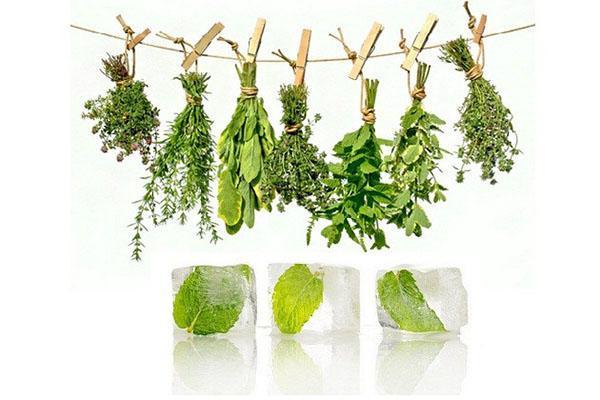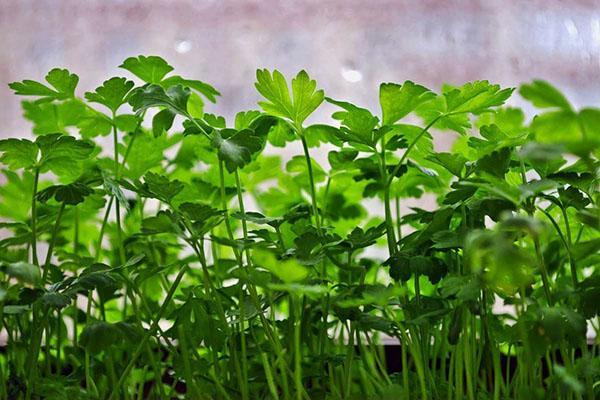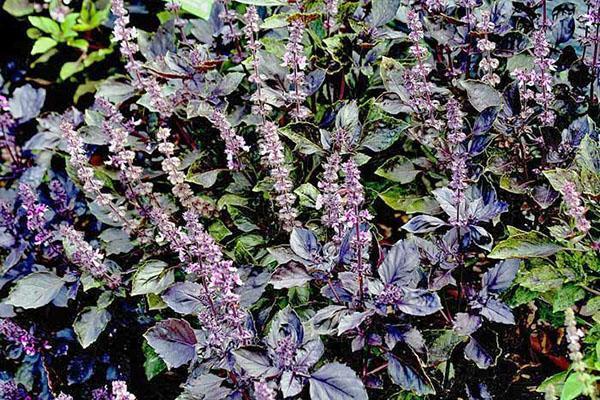How to prepare herbs for the winter: tips from experts
 The unusual taste of herbs gives the dishes an exquisite aroma, piquancy and originality. Unfortunately, summer is already running out and sensible housewives are thinking about how to prepare spicy herbs for the winter, preserving their original taste. There are many options for how best to do this. But only proven recipes deserve the trust of wise chefs.
The unusual taste of herbs gives the dishes an exquisite aroma, piquancy and originality. Unfortunately, summer is already running out and sensible housewives are thinking about how to prepare spicy herbs for the winter, preserving their original taste. There are many options for how best to do this. But only proven recipes deserve the trust of wise chefs.
Seasonal preparation of spices eliminates the need to buy herbs grown on nitrates in winter.
The right time to harvest

According to experts, spicy plants are harvested before flowering. During this time, the foliage is very soft and contains a huge amount of health benefits. Indeed, during flowering, herbs direct their forces to the development of buds. And after that, they lose their aroma and acquire a bitter taste.
Before you prepare spicy herbs for the winter, you need to note the following points for yourself:
- flowering period;
- weather;
- Times of Day;
- type of plant (annual, perennial);
- procurement method.
Since all herbs are different, it means that each has its own flowering period. A simple observation will help you determine when and how to stock up herbs for the winter. Let's take a look at some of them:
- Parsley. This perennial plant is ready to harvest when mature foliage grows.
- Kinza. The fragrant spice is harvested as soon as the bushes reach 12 cm in height.
- Basil (oregano). In the middle of summer, the plant is most suitable for harvesting.
- Rosemary. On the territory of southern latitudes, they are harvested several times throughout the year.

- Mint. It blooms at the end of May, so it is important not to miss the moment.
- Melissa. It is best to pick in mid-June before budding.
Similar guidelines apply when herbs are harvested for drying. It is good to do this in the early morning after the moisture has evaporated. Some cut greens in the evenings, when the dew has not yet appeared on the herbs. As a result, there will be practically no dirt and dust on them. This method is used for harvesting marjoram, sage, thyme and dill. To preserve the beneficial properties and aroma of spices, they are dried naturally.
How to prepare herbs for the winter: useful tips and recipes
 The easiest way to preserve the beneficial properties of greens is to sprinkle them with salt. It is used for such popular herbs:
The easiest way to preserve the beneficial properties of greens is to sprinkle them with salt. It is used for such popular herbs:
- dill;
- basil;
- rosemary;
- thyme;
- sage.
Due to the preserving properties of salt, plants are preserved until the next harvest. In addition, culinary experts use this mixture as a fragrant seasoning for meat and fish dishes.
 To prepare greens for the winter with salt, you should adhere to the basic principle: 200 grams of salt is put on 1 kg of herbs. And they do it quite simply:
To prepare greens for the winter with salt, you should adhere to the basic principle: 200 grams of salt is put on 1 kg of herbs. And they do it quite simply:
- salt is poured onto the bottom of the container;
- lay out chopped greens;
- tamp the layer;
- covered with salt again.
Coarse table or sea salt is suitable for preparation.
The top of the product is completely covered with a preservative. After that, the container is covered and insisted for a whole month. Store in a cool place.
An equally popular way is to preserve herbs for the winter. This method is suitable for such plants:
- dill;
- lettuce leaves;
- fennel;

- parsley.
Although the canned herb does not contain that much vitamin, it can be stored anywhere. The product is prepared in the classical way, using the proportion: 1 kg of herbs, 100 grams of salt, 1 liter of pure water. Closed cans are placed in the cellar or in the pantry. In the cold season, greens are added to hot dishes and side dishes, served with meat, fish and salads.
Harvesting fennel for the winter, a close relative of dill, includes the following operations:
- first, the lush branches of the plant are collected;
- folded into a container and poured with water so that dust and dirt fall off and settle to the bottom;
- washed greens under the tap;
- dried by spreading out on a paper towel;
- put fennel in jars;
- pour boiling water;
- sealed with tin lids.

A similar method is used for other types of spicy plants that grow in their summer cottage.
Aromatic herbs for the winter
 In order to have greens on the table in the cold season, wise culinary specialists prepare seasonings from it in the summer. The abundance of spices allows you to try various recipes of experts in this business. Let's consider the most popular ones.
In order to have greens on the table in the cold season, wise culinary specialists prepare seasonings from it in the summer. The abundance of spices allows you to try various recipes of experts in this business. Let's consider the most popular ones.
Eastern spice - cilantro

You can prepare an original herb seasoning for the winter from the following products:
- cilantro;
- lemon;
- vegetable oil;
- coriander;
- hops-suneli;
- salt.
Cooking process:
- thoroughly wash the cilantro twigs;
- dried on paper towels;
- clean leaves are cut into strips;
- poured with lemon juice and spices;
- knead with your hands;
- add sunflower oil;
- put in jars.
The seasoning is covered with nylon lids and stored in a cold room or in the refrigerator.
Basil combined with nuts
 Since harvesting greens for the winter at home does not require special skills, many housewives prepare various options for such seasonings. Basil fans suggest making a treat from the following ingredients:
Since harvesting greens for the winter at home does not require special skills, many housewives prepare various options for such seasonings. Basil fans suggest making a treat from the following ingredients:
- several bunches of basil;
- walnuts;
- olive oil;
- garlic;
- salt.
 Washed greens are crushed using a meat grinder. Walnuts are peeled, crushed (you can manually) and mixed with green gruel. Add olive oil, salt and garlic to the resulting mass. They are laid out in jars and sterilized for about a quarter of an hour.
Washed greens are crushed using a meat grinder. Walnuts are peeled, crushed (you can manually) and mixed with green gruel. Add olive oil, salt and garlic to the resulting mass. They are laid out in jars and sterilized for about a quarter of an hour.
To prevent mold from appearing on the top of the seasonings, cover it with a layer of vegetable oil.
Oil infusions on spicy herbs
 To enrich the body with vitamins in winter, experienced chefs prepare all kinds of tinctures. To do this, use traditional spicy plants from the garden:
To enrich the body with vitamins in winter, experienced chefs prepare all kinds of tinctures. To do this, use traditional spicy plants from the garden:
- basil;
- mint;
- tarragon;
- rosemary;
- savory;
- thyme;
- marjoram.
Aromatic herbal oil infusions can be prepared in just 2 hours. To do this, take several branches of greenery, a pretty container and oil. First, the grass is washed thoroughly. While it dries, heat the oil over low heat. Next, it is poured into jars with chopped grass, closed with a lid. Insist in a cold room away from sunlight for about 7 days. The finished product is added to vegetable oil when frying vegetables or meat products.
Safe cover for workpieces
 It is useful for wise housewives to know how to store herbs so that they can be added to savory dishes all winter. After all, dried plants can absorb moisture, dust, odors, and sometimes harmful substances. As a result, they will lose their value, turning into ordinary hay for livestock. No one would like to experience such disappointment. Therefore, adhering to simple rules, you can prevent this.
It is useful for wise housewives to know how to store herbs so that they can be added to savory dishes all winter. After all, dried plants can absorb moisture, dust, odors, and sometimes harmful substances. As a result, they will lose their value, turning into ordinary hay for livestock. No one would like to experience such disappointment. Therefore, adhering to simple rules, you can prevent this.
The spices are best folded in a cotton bag, jars or cardboard boxes. It is advisable to store the product in a well-ventilated area. It is best to keep canned greens in the basement. And the salted version is in the refrigerator.Oil tinctures "live" in the pantry no more than 2 months. Frozen greens will retain their properties until the start of the new season. Applying the advice of experts, the approach of winter for wise cooks will bring joy and satisfaction.